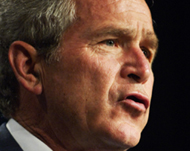Major powers to offer Iran new deal
European officials are to prepare a package of benefits and penalties for Iran after major powers failed to bridge their differences on a UN resolution aimed at curbing Tehran’s nuclear programme.

The five permanent members of the UN Security Council – United States, Russia, China, Britain and France – along with Germany, authorised Britain, France and Germany on Tuesday to prepare the package.
Foreign ministers from the six big powers met for two hours on Monday as a group and then again in one-on-one meetings on Tuesday.
Condoleezza Rice, the US secretary of state, backed the new approach.
“The United States has long supported an effort by the Russians, an effort by the EU, to make available to the Iranian regime, should they choose to do so, a way to fulfil aspirations for a civil nuclear programme.
“And that is what is being discussed, is how might that be made available again,” she said.
Choice
George Bush, the US president, said on Tuesday that his administration viewed diplomacy as the first and most important option in dealing with Tehran.
“The first option and the most important option is diplomacy,” Bush told a forum.
“I believe we can accomplish this through diplomacy.”
Rice later told a news conference that the aim of the package was not just to present Iran with incentives but a choice, one leading to international integration and the other to isolation.
 |
|
Bush: Diplomacy is first and most |
Margaret Beckett, the British foreign secretary, said that the Iranians had to realise “they don’t need to carry on with it because there are ways to do what they say they want”.
“What is the exact nature of something that could perhaps give them that way out? That is exactly what everybody will be exploring,” Beckett said.
Sergei Lavrov, the Russian foreign minister, continued to resist endorsing tougher steps.
He called for new negotiations between Iran and the three European countries, but said: “I don’t like terms like carrots and sticks. I prefer to speak about reasonable proposals which would show a positive alternative.”
Philippe Douste-Blazy, the French foreign minister, said if Iran co-operated with the international community it could be rewarded with an “ambitious package – in the domain of civilian nuclear energy, in the domain of trade, in the domain of technology and, why not, in the security domain”.
Unlike a previous package offered to Iran by the three European countries – known as the EU3 – with Iran last year, the Europeans aim to get the United States, Russia and China on board as partners.
One diplomat said there would be specific commitments to back sanctions if the economic and political inducements do not persuade Iran to abandon nuclear work.
Deadlock over resolution
No agreement has been reached among the ministers on the UN Security Council resolution, despite hours of talks, and US and British officials said no vote was expected this week.
The resolution, drafted by France and Britain and backed by the United States, would order Iran to suspend its nuclear programmes immediately under Chapter 7 of the UN charter, which makes an action legally binding.
Chapter 7, used in dozens of Security Council resolutions, allows for sanctions and even war, but a separate resolution is required to specify either step.
Russia and China, which have veto power in the 15-nation Security Council, fear too much pressure on Iran would be self-defeating or precipitate an oil crisis.
Both worry the US would use a resolution under Chapter 7 to justify military action.
Li Zhaoxing, the foreign minister of China, said on Tuesday he still opposed a resolution under Chapter 7 and Lavrov said “we don’t believe this is necessary to discuss at this stage”.